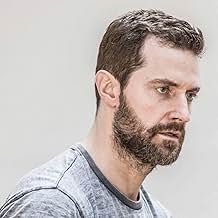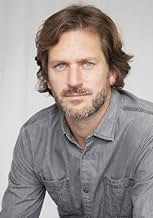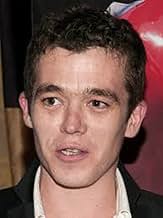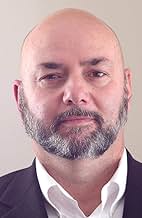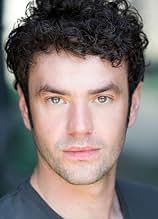AVALIAÇÃO DA IMDb
5,9/10
7 mil
SUA AVALIAÇÃO
Na Irlanda do século 13, um grupo de monges deve escoltar uma relíquia sagrada por uma paisagem repleta de perigos.Na Irlanda do século 13, um grupo de monges deve escoltar uma relíquia sagrada por uma paisagem repleta de perigos.Na Irlanda do século 13, um grupo de monges deve escoltar uma relíquia sagrada por uma paisagem repleta de perigos.
- Prêmios
- 1 vitória e 3 indicações no total
Akilas Karazisis
- The Killer
- (as Akillas Karazisis)
Gaëtan Wenders
- Fournier
- (as Gaetan Wenders)
Avaliações em destaque
Yes this film is bloody. For some the scenes might even be shocking, but I really enjoyed this film. Acting was good, the suspense build up was very good. And at no point did it seem the violence was unnecessary. If you enjoy historical type films and don't mind seeing a head bashed in close up, you will enjoy this.
As far as period pieces set in the middle ages go, this one isn't very glamorous. It's a decently well made film with some strong individual performances that basically carry a mostly disjointed and only slightly nuanced story. My rating for this movie is a fairly weak 7/10. That rating is floated higher than I would have normally given it for three specific reasons.
First, the performances: Holland as the young, pious monk who has never known anything but life in the monastery yet quickly matures when faced with adversity. Bernthal as the obedient and entirely subservient mute with an obviously profound yet mysterious history who becomes the star of the show on more than one occasion without saying a word. Stanley Weber as the Cistercian, the guy the Church sends out to do their dirty work basically and effectively starts the "Pilgrimage" in the first place. Of course, there's also Richard Armitage as the surly French knight commanding his Baron father's equally surly men while throwing surly looks around all the time. This would have been a horribly dull and hard to watch movie if these guys didn't pull off these fairly typical medieval character archetypes well and it feels to me like they did.
Second, the action and set sequences were well done. I tend to be the kind of person who is immediately thrown off by a bad transition or a sequence of shots that just don't really work well together. I didn't see very much of that in this film. Granted, it's not difficult managing scene transition when most every scene is shot outdoors in Ireland but when the action happens, it's brutal and effective.
Third, symbolism. If you are someone who does not like it when a movie expects you to draw your own significance from the story it's trying to tell, this is not a movie you might like. Religion is a central theme in this movie and it is built on a foundation of symbolism that can be taken any number of different ways. If you like diving into the deeper meaning of things, you will actually love this movie. Especially how it ends.
First, the performances: Holland as the young, pious monk who has never known anything but life in the monastery yet quickly matures when faced with adversity. Bernthal as the obedient and entirely subservient mute with an obviously profound yet mysterious history who becomes the star of the show on more than one occasion without saying a word. Stanley Weber as the Cistercian, the guy the Church sends out to do their dirty work basically and effectively starts the "Pilgrimage" in the first place. Of course, there's also Richard Armitage as the surly French knight commanding his Baron father's equally surly men while throwing surly looks around all the time. This would have been a horribly dull and hard to watch movie if these guys didn't pull off these fairly typical medieval character archetypes well and it feels to me like they did.
Second, the action and set sequences were well done. I tend to be the kind of person who is immediately thrown off by a bad transition or a sequence of shots that just don't really work well together. I didn't see very much of that in this film. Granted, it's not difficult managing scene transition when most every scene is shot outdoors in Ireland but when the action happens, it's brutal and effective.
Third, symbolism. If you are someone who does not like it when a movie expects you to draw your own significance from the story it's trying to tell, this is not a movie you might like. Religion is a central theme in this movie and it is built on a foundation of symbolism that can be taken any number of different ways. If you like diving into the deeper meaning of things, you will actually love this movie. Especially how it ends.
I've gone for this movie with no expectations based on its rating ,, but I was really surprised .. This movie is really Powerful that after its end it would make you think for a while about your convictions or the principles of your beliefs . * maybe not going wrong with them but just questioning *
It discusses things not about religion but particularly the way of Religious speech and people who may control the message of religions in general ( Not Christianity in particular ) and how politics also may affect how things work ..
The acting is very good especially that of Jon Bernthal ( The Mute ) .. The music is well played as well as the picture ,, Great Atmosphere of that period of time ( 13th century ) with bloody violent action scenes which were really well performed
This is my first movie of the director Brendan Muldowney and I think it won't be the last .. Great Job
Overall I liked nearly everything about the movie . If you're interested in that period of time and historical movies , Just go for it ..
It discusses things not about religion but particularly the way of Religious speech and people who may control the message of religions in general ( Not Christianity in particular ) and how politics also may affect how things work ..
The acting is very good especially that of Jon Bernthal ( The Mute ) .. The music is well played as well as the picture ,, Great Atmosphere of that period of time ( 13th century ) with bloody violent action scenes which were really well performed
This is my first movie of the director Brendan Muldowney and I think it won't be the last .. Great Job
Overall I liked nearly everything about the movie . If you're interested in that period of time and historical movies , Just go for it ..
This strong, atmospheric, and beautifully-made little film did not disappoint based on reviews that either put it in the trash for "gratuitous violence" or gave it a firm pat on the head for a good attempt.
I see the value in the latter assessment - working on a budget, this film does a lot with what it has, providing hauntingly beautiful vistas of an ancient Ireland and making its story stretch beyond its small shooting framework. The actors, too, make so much of the script they've been given, with great performances throughout. Although this does lead me onto the main drawback of the film: the characters are largely undeveloped, especially that of Diarmuid - who is the protagonist no less - and his Brothers. We can see that he cares about them a lot - after all, "the monastery is all he's ever known" - but more development would have been crucial to making me really care about whether they lived or died, failed or succeeded. The most interesting characters for me were Geraldus and the Mute, "grey" characters whose backstories are hinted at if never fully disclosed, and with sublime subtlety in the case of Bernthal's character. The characters we do get to truly see are rewarding, albeit darkly, and were one of the film's greatest triumphs - it just would have been great to see the same treatment given to the lead protagonist and primary villain.
In the other camp, I don't think the story could have worked without the levels of violence, savagery, and loss that we see, which the viewer must witness with the same unblinking acceptance that the characters do. In this, there is a hidden depth to Pilgrimage, a story about Ireland, the land where "there was never peace". One review focused around the particular Irishness of the film rang true in some places - that the colour shown here is multiple shades of grey, and little green - if not in others. This is not a deconstruction of the "Irish" mythos, but it does touch, tenderly and reverentially, upon the idea of an unattainable relic: to know peace, both within and without, a dream not limited to this country but echoed in Jerusalem and beyond. Though it does not present its findings in a wholly satisfying parcel, the film did provoke thought about where that quest for peace could lead us next - to what bloody ends or watery graves? To what loss and to what triumphs?
"Where to now?"
I see the value in the latter assessment - working on a budget, this film does a lot with what it has, providing hauntingly beautiful vistas of an ancient Ireland and making its story stretch beyond its small shooting framework. The actors, too, make so much of the script they've been given, with great performances throughout. Although this does lead me onto the main drawback of the film: the characters are largely undeveloped, especially that of Diarmuid - who is the protagonist no less - and his Brothers. We can see that he cares about them a lot - after all, "the monastery is all he's ever known" - but more development would have been crucial to making me really care about whether they lived or died, failed or succeeded. The most interesting characters for me were Geraldus and the Mute, "grey" characters whose backstories are hinted at if never fully disclosed, and with sublime subtlety in the case of Bernthal's character. The characters we do get to truly see are rewarding, albeit darkly, and were one of the film's greatest triumphs - it just would have been great to see the same treatment given to the lead protagonist and primary villain.
In the other camp, I don't think the story could have worked without the levels of violence, savagery, and loss that we see, which the viewer must witness with the same unblinking acceptance that the characters do. In this, there is a hidden depth to Pilgrimage, a story about Ireland, the land where "there was never peace". One review focused around the particular Irishness of the film rang true in some places - that the colour shown here is multiple shades of grey, and little green - if not in others. This is not a deconstruction of the "Irish" mythos, but it does touch, tenderly and reverentially, upon the idea of an unattainable relic: to know peace, both within and without, a dream not limited to this country but echoed in Jerusalem and beyond. Though it does not present its findings in a wholly satisfying parcel, the film did provoke thought about where that quest for peace could lead us next - to what bloody ends or watery graves? To what loss and to what triumphs?
"Where to now?"
This is very good. far more realistic than Hollywood might produce. it's interesting, much dogma was born of superstition, identifications that without science, were attributed to whatever godly (natural) forces our people believed in at the time. However, belief is a force unto itself and it does serve to manipulate circumstance. that is in here too. well told
Você sabia?
- CuriosidadesTo prepare for his role, Jon Bernthal spent the first few weeks of shooting completely silent, even when he's not on set.
- Erros de gravaçãoTodas as entradas contêm spoilers
Principais escolhas
Faça login para avaliar e ver a lista de recomendações personalizadas
- How long is Pilgrimage?Fornecido pela Alexa
Detalhes
- Data de lançamento
- Países de origem
- Idiomas
- Também conhecido como
- El sacrilegio
- Locações de filme
- Empresas de produção
- Consulte mais créditos da empresa na IMDbPro
Bilheteria
- Orçamento
- € 4.749.500 (estimativa)
- Faturamento bruto mundial
- US$ 23.689
- Tempo de duração
- 1 h 36 min(96 min)
- Cor
- Mixagem de som
- Proporção
- 2.35 : 1
Contribua para esta página
Sugerir uma alteração ou adicionar conteúdo ausente



